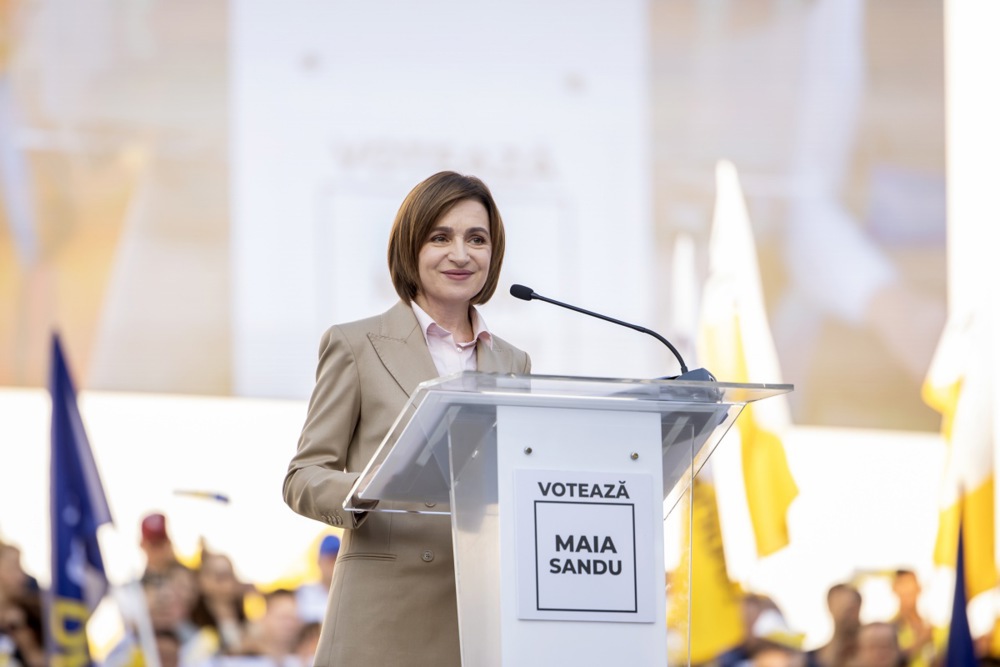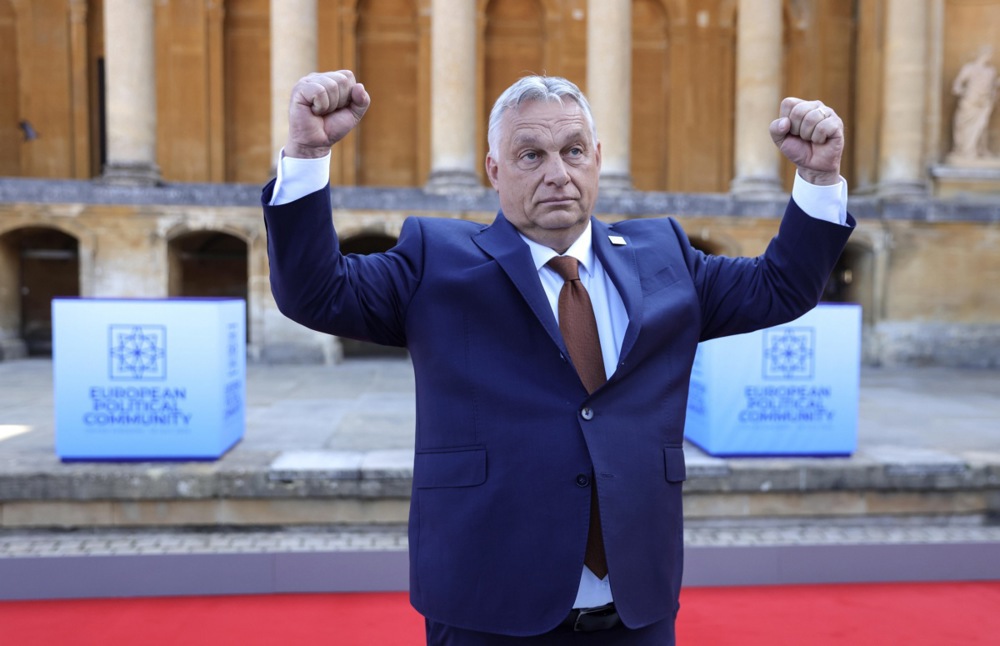Moldova, a former Soviet Union country sandwiched between Ukraine and Romania, is set for significant elections on October 20 when voters must choose between partnering with the European Union or with Russia.
Contenders on both sides are using their influence and money to convince voters in the tiny country to align with them.
Alongside the presidential election, Moldova will hold a long-awaited referendum on European Union membership, voting on whether to make accession to the EU a constitutional goal.
Most of the 11 candidates standing in the election support joining the EU, while two are opposed.
Latest polls have indicated that the incumbent pro-western President Maia Sandu is firmly ahead, with most giving her 40 per cent of the vote.
Moldova, Intellect Group poll:
Presidential election
Sandu (*-EPP): 43% (+10)
Stoianoglo (*): 19% (+2)
Usatîi (PN-*): 18% (+9)
Vlah (*): 6% (-1)
Tarlev (PVM-*): 4% (-3)
Chicu (PDCM-*): 2%
Furtună (*): 2% (new)
Năstase (*): 2% (-3)
Morari (*): 2% (-1)
Țîcu (BÎ-EPP): 1% (n.a.)… pic.twitter.com/FMJWLWXKWE— Europe Elects (@EuropeElects) October 17, 2024
While the landlocked Moldova is a minor economy, with many of its 3.5 million inhabitants living in poverty and having limited access to services or viable economic opportunities, its location at the eastern border of the EU, right next to Ukraine, has given it a growing geopolitical importance.
The administration in the capital Chișinău is no longer in the Kremlin’s orbit. The present government is looking for a close connection with the West, a policy which has intensified with the Russian invasion of Ukraine.
In March 2022, Moldova embarked on its formal path toward European integration by submitting its membership application and within three months European leaders formally acknowledged its candidacy status.
The EU has told Moldova it must work on structural reforms to improve its economy and to combat corruption in line with standards set by Brussels.
Part of those structural reforms include improvements regarding land ownership and business operations which the EU says will improve productivity in agriculture and local industry. Energy prices may also become volatile.
Next to the historical influence of Russia, there is also the issue of Moldova’s eastern region of Transnistria, a breakaway state under separatist control, with approximately 2,000 Russian military personnel stationed in the territory.
Russia allegedly is not accepting the possible departure of its former satellite state from its sphere of influence and is said to be pouring millions of euros into so-called hybrid warfare.
Sandu has long accused Russia of trying to topple her government in a number of ways, claims which Moscow has denied.
Moldovan political parties have become divided between a right-wing and a left-wing bloc, with the Right being pro-Western and the Left, formed by the Block of Communists and Socialists along with the Sor party, being pro-Moscow.
National police chief Viorel Cernautanu has claimed tens of thousands of Moldovans have been bribed by a Russia-managed network to vote “no” in the EU referendum and in favour of Russia-friendly candidates in what he called an “unprecedented, direct attack”.
He said the Kremlin had paid more than $15 million (€13.6 million) into around 130,000 Moldovan citizens’ accounts opened with Russia’s Promsvyazbank in September.
Meanwhile, among the most vocal opponents to EU membership is fugitive Israeli-born pro-Russian Moldovan businessman Ilan Shor.
He was convicted last year in absentia to 15 years in prison for his role in the theft of $1 billion (€900,000) from Moldovan banks. In September, he allegedly offered payments to anyone who voted against European integration in the referendum, something Shor, who fled to Israel and later to Moscow, denies. He was granted Russian citizenship earlier this year.
In addition, Shor is the founder and leader of the pro-Russian populist opposition party named after him. The CCM, Moldova’s Constitutional Court, ruled in June 2023 that the ȘOR Party was unconstitutional.
The ruling was based on Article 41 of the Constitution of Moldova, which states: “Parties and other socio-political organisations whose goals or activities are directed against political pluralism, the principles of the rule of law, sovereignty, independence and territorial integrity of the Republic of Moldova, are unconstitutional.”

The decision was founded on the party’s alleged persistent infractions of transparency while it organised protests against the government. The party is said to have incited violence. ȘOR’s vice president Marina Tauber was reportedly seen actively inciting protesters during these events.
In a press release on October 16, US National Security Council spokesman John Kirby said: “Russia is working actively to undermine Moldova’s election and its European integration.”
“In the last several months, Moscow has dedicated millions of dollars to influencing Moldova’s presidential election. We assess that this money has gone toward financing its preferred parties and spreading disinformation on social media in favour of their campaigns.”
On October 9, the European Parliament adopted a resolution issuing a strong warning against continued Russian attempts to derail Moldova’s pro-European trajectory.
According to MEPs, Moldovan security services recently stated that Russia has spent approximately €100 million to undermine the upcoming electoral process in order to get Moldovans to vote against closer ties with the EU.

But at the same time, European Commission President Ursula von der Leyen had already announced €1.8 billion in financial support to Moldova for the next three years.
“You have a very ambitious economic plan for Moldova and the EU will support this plan. We believe we can help you double the size of your economy in the next 10 years. We will invest €1.8 billion in your economy over the next three years,” von der Leyen said on October 10 when visiting Sandu in Chișinău.
Named the Growth Plan, the aid programme will run from 2025 through 2027. Every six months, Moldova will receive financial support packages after evaluation reports on the execution of measures required for EU membership.
Von der Leyen praised Sandu for “how committed she is to the European path”.
Moldova has also received significant funding from Washington. In 2022 the US allocated $20 million in economic support to bolster Moldova’s resilience against external pressures from Russia. In 2023, an additional $30 million was granted for economic development and public services, alongside $10 million specifically aimed at enhancing energy security.
Western liberal NGOs including the US-based George Soros Foundation are also on the ground. Between 1992 and 2012, the Foundation poured more than $87 million into Moldova’s coffers. In 2021, Soros put another $3.4 million into the country.







